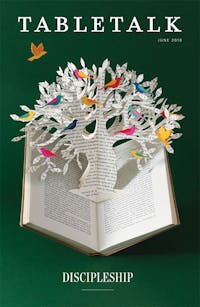
Request your free, three-month trial to Tabletalk magazine. You’ll receive the print issue monthly and gain immediate digital access to decades of archives. This trial is risk-free. No credit card required.
Try Tabletalk NowAlready receive Tabletalk magazine every month?
Verify your email address to gain unlimited access.
Ever had double vision where your brain saw one picture twice, overlapping and leaving you disoriented? James warns that we can be double-visioned or double-minded (literally, “double-souled”) in our view of and relationship to God. When we pray or think about the Lord, a competing thought or picture may enter our minds, such as a lust for money or distaste over God’s providence in our lives. Suddenly, a real contest arises over which vision we prefer. Then we have doubts, and doubts have a way of multiplying, producing a double-minded soul. This is a serious challenge to our faith. Jesus spoke of this danger in Matthew 6:24, likening it to trying to serve two masters, which is impossible. This is double-mindedness, and it blows cold air on a heart aflame.
James expanded Jesus’ warning that doubt and double-mindedness make us “unstable in all [our] ways” (James 1:8). Let’s have a look at James 1 so that we may keep our hearts aflame.
Causes of Double-Mindedness
According to commentator Douglas J. Moo, James was likely addressing former members of his own congregation in Jerusalem who had fled Israel due to religious persecution (Acts 11:19). James called these souls the “dispersed” (James 1:1)—those separated from the mother church in Jerusalem due to persecution (see Isaiah 49:6; 1 Peter 1:1). “Dispersed” is a crucial term to grasp in order to get the most out of James’ exhortation. These believers had become strangers in a foreign land, a situation similar to their ancestors’ exile in Assyria or Babylonia. Being dispersed in spiritually hostile territory opens the door to bewilderment—doubt over God’s providence, plus temptations to be like the new neighbors. It can divide the mind over religion, provide an alternative picture. Double, you see.
Today, many who call themselves Christians voluntarily disperse or separate themselves from the visible church. Lacking the normal means of grace—reading and preaching of the Word, the sacraments, prayer—they begin to think of alternative definitions of the church or extrabiblical ways to be the church. They become double-minded about church.
In 1:2, James addresses trials of various kinds. Like many of us today, these saints did not immediately form positive pictures of God’s testing providences and were not steadfast under testing (vv. 3–4). Without the picture God wanted them to have in mind, even when they prayed over their trials, they lacked wisdom and allowed doubts to enter their thinking and compete with a correct view of God (vv. 5–6). They lost assurance that God would hear their prayers (v. 7). They became double-minded (v. 8) and unstable spiritually. Have you been there?
Add in verse 14, which says that all believers on earth live in yet-unredeemed bodies that are capable of being deceived about God (see v. 16), and we have professing Christians who are double-minded persons, experiencing a battle of allegiances.
Thankfully, James’ letter is full of cures for double-mindedness.
First, be sure you are a true believer, a servant of the Lord Jesus Christ (v. 1).
Second, correct any dispersion or separation from Christ’s church (v. 1). Adopt God’s plan for caring for you and all His children: His church to which He has given spiritual gifts—pastors, teachers—His life-sustaining sacraments, and His own presence in worship. View the church as vital to your spiritual welfare and service.
Third, confess double-mindedness regarding God’s plan of sanctification, which purposely utilizes trials in order to build up our faith (vv. 2–4). The double mind sees evil in the trial and God only on the periphery. The spiritually focused mind sees God in control and working for our good. David said, “It is good for me that I was afflicted” (Ps. 119:71). James says, “Count it all joy” (James 1:2). You can do this only if your mind is singularly focused on God’s plan.
Fourth, be single-minded about God’s generosity toward you. Use James 1:5–8 to help you repent of doubting God’s goodness and His generosity. Focus on the “crown of life which He has promised to those who love Him” (v. 12). Relish verses 17–18:
Every good gift and every perfect gift is from above, coming down from the Father of lights with whom there is no variation or shadow due to change. Of his own will he brought us forth by the word of truth, that we should be a kind of firstfruits of his creatures.
Finally, see the bigger picture. See all of James’ exhortations and wisdom in light of the One he called the “Lord,” even Jesus Christ (v. 1).
Jesus was dispersed—sent into this hostile world by the Father’s will. He was separated from the true church in heaven and was immersed in a far more rigorous calling than we will ever face.
Jesus willingly, joyfully faced the trials His Father sent, fulfilling James’ exhortation in verse 2.
Jesus persevered in and grew through His trials (vv. 3–4). Jesus met and defeated the tempter via the Word, much prayer, and faith without doubting (v. 5). He kept His mind singularly focused on pleasing the Father.
Jesus received the crown of life (v. 12) for His complete faith and obedience. He was highly exalted, raised from the dead, received in glory back to heaven. As King of kings, Jesus now rules over all things for us, the church (Eph. 1:20–23). That means that Jesus is in charge of saving us, sanctifying us (through trials), employing us in His service, and delivering us at last spotless into His glory.
Keep your mind focused on Jesus, and your heart will be aflame.
